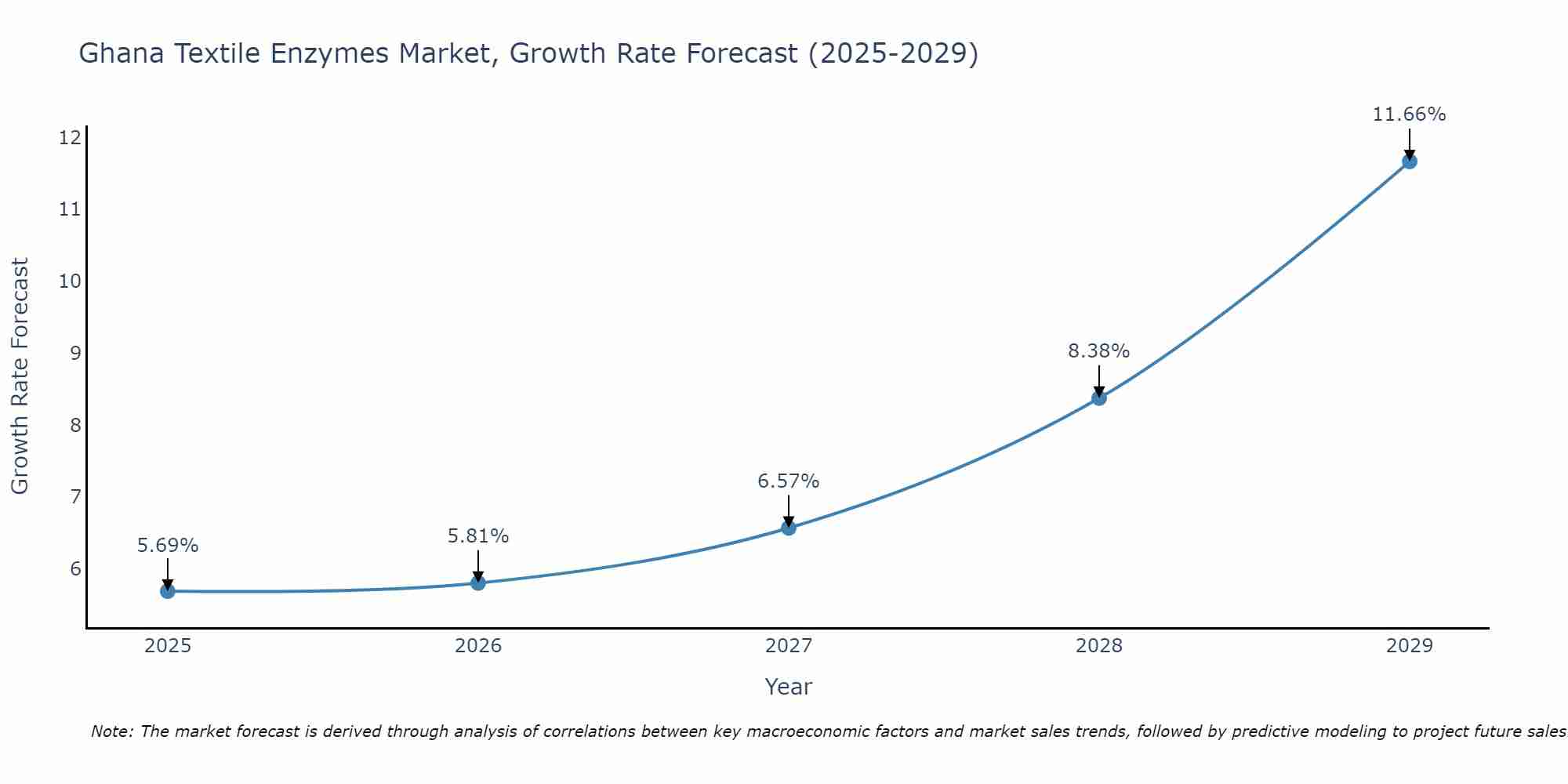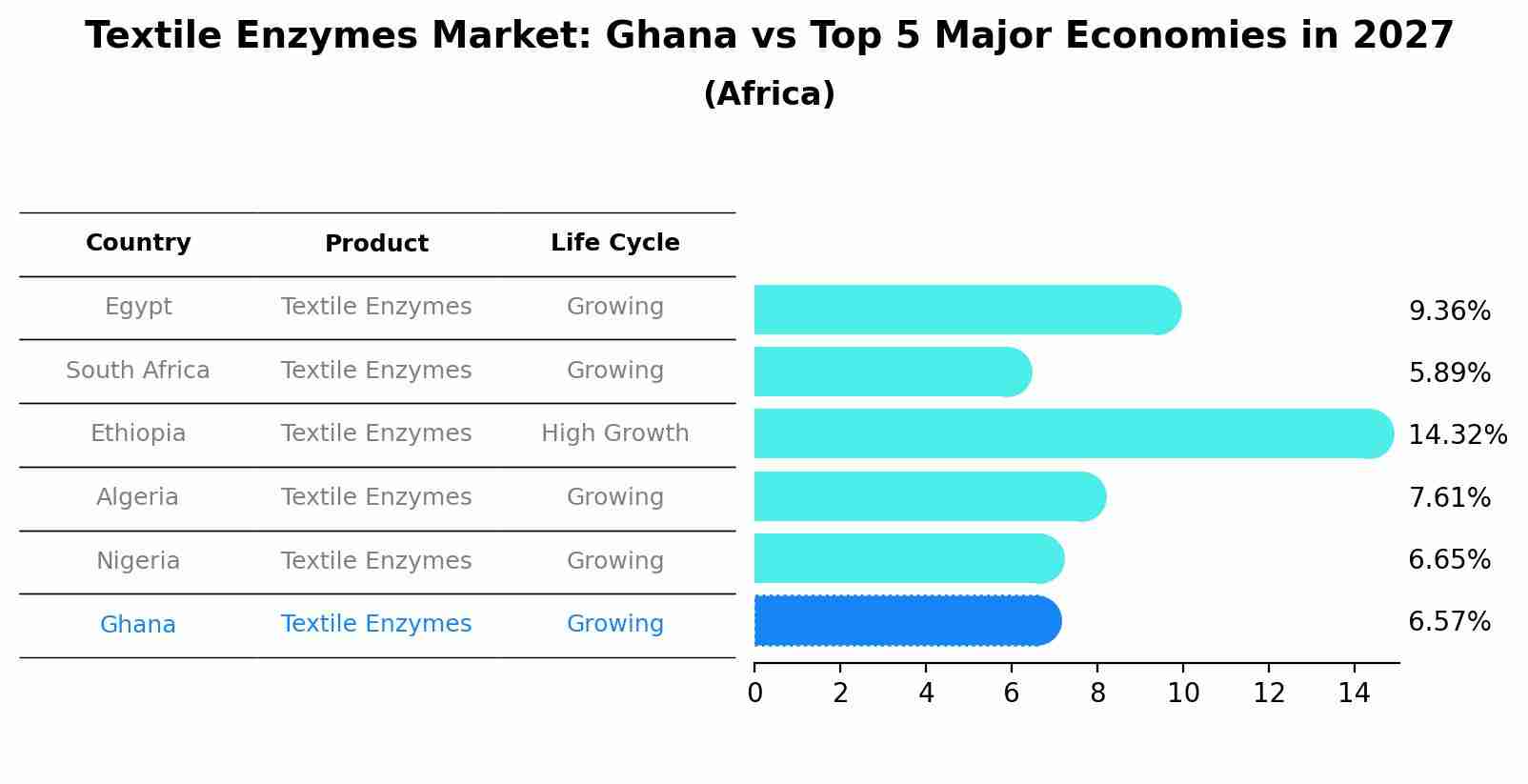Ghana Textile Enzymes Market (2025-2031) Outlook | Analysis, Growth, Value, Trends, Size, Share, Companies, Forecast, Industry & Revenue
| Product Code: ETC094095 | Publication Date: Jun 2021 | Updated Date: Jun 2025 | Product Type: Report | |
| Publisher: 6Wresearch | Author: Dhaval Chaurasia | No. of Pages: 70 | No. of Figures: 35 | No. of Tables: 5 |
Ghana Textile Enzymes Market Size Growth Rate
The Ghana Textile Enzymes Market is likely to experience consistent growth rate gains over the period 2025 to 2029. The growth rate starts at 5.69% in 2025 and reaches 11.66% by 2029.

Textile Enzymes Market: Ghana vs Top 5 Major Economies in 2027 (Africa)
Ghana's Textile Enzymes market is anticipated to experience a growing growth rate of 6.57% by 2027, reflecting trends observed in the largest economy Egypt, followed by South Africa, Ethiopia, Algeria and Nigeria.

Ghana Textile Enzymes Market Overview
The Ghana Textile Enzymes Market is witnessing steady growth due to increasing demand for eco-friendly and sustainable textile production processes. Enzymes are being increasingly used in the textile industry for various processes such as desizing, bio-polishing, and stone-washing, as they offer efficient and cost-effective solutions compared to traditional chemical methods. The market is also driven by the growing awareness among consumers regarding the environmental impact of textile production, leading manufacturers to adopt enzyme-based solutions. Key players in the Ghana Textile Enzymes Market include Novozymes, AB Enzymes, and Dyadic International. The market is expected to continue expanding as more textile companies in Ghana and across the region shift towards environmentally friendly production practices.
Ghana Textile Enzymes Market Trends
The Ghana Textile Enzymes Market is experiencing a shift towards eco-friendly and sustainable solutions as consumer awareness about environmental impact increases. Enzymes are being increasingly used in textile processing for their effectiveness in reducing water and energy consumption, as well as improving production efficiency. Key trends include the adoption of bio-polishing enzymes for enhancing fabric quality and the utilization of cellulase enzymes for denim finishing. Manufacturers are focusing on developing enzyme formulations that are more cost-effective and provide better performance, driving innovation in the market. Additionally, there is a growing demand for enzymes that can replace traditional chemical processes in order to reduce the ecological footprint of the textile industry in Ghana. Overall, sustainability and efficiency are driving forces in shaping the current trends in the Ghana Textile Enzymes Market.
Ghana Textile Enzymes Market Challenges
In the Ghana Textile Enzymes Market, several challenges are faced, including inadequate infrastructure for manufacturing and distribution, limited awareness and understanding of the benefits of using enzymes in textile processing among local textile manufacturers, and the prevalence of traditional methods that hinder the adoption of enzyme technology. Additionally, the high cost of enzyme products and the lack of technical expertise in utilizing enzymes for textile processing pose significant hurdles for market growth. Addressing these challenges will require investments in infrastructure development, education and training programs to increase awareness and knowledge about textile enzymes, as well as collaborations with international partners to access advanced enzyme technologies and expertise.
Ghana Textile Enzymes Market Investment Opportunities
In the Ghana Textile Enzymes Market, there are several investment opportunities worth considering. With the growing demand for sustainable and eco-friendly textile production processes, investing in enzymatic solutions for the textile industry can be lucrative. Enzymes offer benefits such as reduced water and energy consumption, improved fabric quality, and lower chemical usage, making them attractive to textile manufacturers looking to optimize their production processes. Additionally, the Ghanaian government`s focus on promoting the textile industry through policies and incentives further enhances the investment potential in this sector. Investing in research and development of new enzyme formulations tailored to the local market needs can also present opportunities for growth and innovation in the Ghana Textile Enzymes Market.
Ghana Textile Enzymes Market Government Policy
The Ghanaian government has implemented various policies to support and regulate the Textile Enzymes Market. These policies include the enforcement of quality standards to ensure the safety and efficacy of enzyme products used in the textile industry. Additionally, the government has introduced tax incentives and subsidies to encourage local production and innovation in the sector. Import restrictions and tariffs have been put in place to protect domestic manufacturers from unfair competition. Furthermore, the government has also initiated programs to promote sustainable practices and environmental stewardship within the textile industry. Overall, these policies aim to foster growth, competitiveness, and sustainability in the Ghana Textile Enzymes Market.
Ghana Textile Enzymes Market Future Outlook
The future outlook for the Ghana Textile Enzymes Market appears promising, with anticipated growth driven by factors such as increasing demand for eco-friendly and sustainable textile processing solutions. Enzymes are gaining popularity in the textile industry due to their ability to improve processing efficiency, reduce water and energy consumption, and enhance the quality of finished textiles. Furthermore, rising awareness about the environmental impact of conventional textile processing methods is expected to drive the adoption of textile enzymes in Ghana. Market players are likely to focus on research and development activities to introduce innovative enzyme solutions that cater to the specific needs of the Ghanaian textile industry, thereby fostering market growth in the coming years.
Key Highlights of the Report:
- Ghana Textile Enzymes Market Outlook
- Market Size of Ghana Textile Enzymes Market, 2021
- Forecast of Ghana Textile Enzymes Market, 2031
- Historical Data and Forecast of Ghana Textile Enzymes Revenues & Volume for the Period 2021 - 2031
- Ghana Textile Enzymes Market Trend Evolution
- Ghana Textile Enzymes Market Drivers and Challenges
- Ghana Textile Enzymes Price Trends
- Ghana Textile Enzymes Porter's Five Forces
- Ghana Textile Enzymes Industry Life Cycle
- Historical Data and Forecast of Ghana Textile Enzymes Market Revenues & Volume By Type for the Period 2021 - 2031
- Historical Data and Forecast of Ghana Textile Enzymes Market Revenues & Volume By Cellulase for the Period 2021 - 2031
- Historical Data and Forecast of Ghana Textile Enzymes Market Revenues & Volume By Amylase for the Period 2021 - 2031
- Historical Data and Forecast of Ghana Textile Enzymes Market Revenues & Volume By Catalase for the Period 2021 - 2031
- Historical Data and Forecast of Ghana Textile Enzymes Market Revenues & Volume By Pectinase for the Period 2021 - 2031
- Historical Data and Forecast of Ghana Textile Enzymes Market Revenues & Volume By Laccase for the Period 2021 - 2031
- Historical Data and Forecast of Ghana Textile Enzymes Market Revenues & Volume By Others for the Period 2021 - 2031
- Historical Data and Forecast of Ghana Textile Enzymes Market Revenues & Volume By Application for the Period 2021 - 2031
- Historical Data and Forecast of Ghana Textile Enzymes Market Revenues & Volume By Bio-polishing for the Period 2021 - 2031
- Historical Data and Forecast of Ghana Textile Enzymes Market Revenues & Volume By Desizing for the Period 2021 - 2031
- Historical Data and Forecast of Ghana Textile Enzymes Market Revenues & Volume By Enzymatic Bleaching for the Period 2021 - 2031
- Historical Data and Forecast of Ghana Textile Enzymes Market Revenues & Volume By Bioscouring for the Period 2021 - 2031
- Historical Data and Forecast of Ghana Textile Enzymes Market Revenues & Volume By Others for the Period 2021 - 2031
- Ghana Textile Enzymes Import Export Trade Statistics
- Market Opportunity Assessment By Type
- Market Opportunity Assessment By Application
- Ghana Textile Enzymes Top Companies Market Share
- Ghana Textile Enzymes Competitive Benchmarking By Technical and Operational Parameters
- Ghana Textile Enzymes Company Profiles
- Ghana Textile Enzymes Key Strategic Recommendations
Frequently Asked Questions About the Market Study (FAQs):
- Single User License$ 1,995
- Department License$ 2,400
- Site License$ 3,120
- Global License$ 3,795
Search
Thought Leadership and Analyst Meet
Our Clients
Related Reports
- Canada Oil and Gas Market (2026-2032) | Share, Segmentation, Value, Industry, Trends, Forecast, Analysis, Size & Revenue, Growth, Competitive Landscape, Outlook, Companies
- Germany Breakfast Food Market (2026-2032) | Industry, Share, Growth, Size, Companies, Value, Analysis, Revenue, Trends, Forecast & Outlook
- Australia Briquette Market (2025-2031) | Growth, Size, Revenue, Forecast, Analysis, Trends, Value, Share, Industry & Companies
- Vietnam System Integrator Market (2025-2031) | Size, Companies, Analysis, Industry, Value, Forecast, Growth, Trends, Revenue & Share
- ASEAN and Thailand Brain Health Supplements Market (2025-2031) | Strategy, Consumer Insights, Analysis, Investment Trends, Opportunities, Growth, Size, Share, Industry, Revenue, Segments, Value, Segmentation, Supply, Forecast, Restraints, Outlook, Competition, Drivers, Trends, Demand, Pricing Analysis, Competitive, Strategic Insights, Companies, Challenges
- ASEAN Bearings Market (2025-2031) | Strategy, Consumer Insights, Analysis, Investment Trends, Opportunities, Growth, Size, Share, Industry, Revenue, Segments, Value, Segmentation, Supply, Forecast, Restraints, Outlook, Competition, Drivers, Trends, Demand, Pricing Analysis, Competitive, Strategic Insights, Companies, Challenges
- Europe Flooring Market (2025-2031) | Outlook, Share, Industry, Trends, Forecast, Companies, Revenue, Size, Analysis, Growth & Value
- Saudi Arabia Manlift Market (2025-2031) | Outlook, Size, Growth, Trends, Companies, Industry, Revenue, Value, Share, Forecast & Analysis
- Uganda Excavator, Crane, and Wheel Loaders Market (2025-2031) | Strategy, Consumer Insights, Analysis, Investment Trends, Opportunities, Growth, Size, Share, Industry, Revenue, Segments, Value, Segmentation, Supply, Forecast, Restraints, Outlook, Competition, Drivers, Trends, Demand, Pricing Analysis, Competitive, Strategic Insights, Companies, Challenges
- Rwanda Excavator, Crane, and Wheel Loaders Market (2025-2031) | Strategy, Consumer Insights, Analysis, Investment Trends, Opportunities, Growth, Size, Share, Industry, Revenue, Segments, Value, Segmentation, Supply, Forecast, Restraints, Outlook, Competition, Drivers, Trends, Demand, Pricing Analysis, Competitive, Strategic Insights, Companies, Challenges
Industry Events and Analyst Meet
Whitepaper
- Middle East & Africa Commercial Security Market Click here to view more.
- Middle East & Africa Fire Safety Systems & Equipment Market Click here to view more.
- GCC Drone Market Click here to view more.
- Middle East Lighting Fixture Market Click here to view more.
- GCC Physical & Perimeter Security Market Click here to view more.
6WResearch In News
- Doha a strategic location for EV manufacturing hub: IPA Qatar
- Demand for luxury TVs surging in the GCC, says Samsung
- Empowering Growth: The Thriving Journey of Bangladesh’s Cable Industry
- Demand for luxury TVs surging in the GCC, says Samsung
- Video call with a traditional healer? Once unthinkable, it’s now common in South Africa
- Intelligent Buildings To Smooth GCC’s Path To Net Zero


















